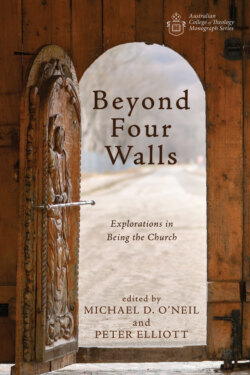Beyond Four Walls

Реклама. ООО «ЛитРес», ИНН: 7719571260.
Оглавление
Группа авторов. Beyond Four Walls
Beyond Four Walls
Table of Contents
Contributors
Introduction
Church as Gospel
Being God’s People Among the Nations
Jonah’s Wail
The Church as Family in the Teaching of Jesus, and Today
Leadership in Apostolic Perspective
The Pastor–Teacher and the Church
I Am A Woman
Living in God’s Mission
Trinitarian Apologetics
Romancing the Church
Cultural Exegesis
The Goldilocks Planet—When It’s Just Not Right
Atonement and Church
The Spirit—Beyond Christ?
Transcending Morality
Отрывок из книги
Explorations in Being the Church
Edited by MICHAEL D. O’NEIL and PETER ELLIOTT
.....
We will assume the conversion story of Paul in Acts 9. What we find is that Paul’s encounter with Jesus, the resurrected, vindicated, and now speaking-to-Paul Jesus, was a one-of-a-kind explosive encounter and from that point on, Paul reframed Israel’s story as a story that was fulfilled in Jesus. Allow me, though, to retrace steps by saying that Paul’s conversion story is not the story of “how he got saved” so much as how he came to the conviction that Jesus was Messiah. Anyone who has studied the stories of Jews who convert to Jesus know that the conversion story is essentially one of exploring whether or not Jesus is Messiah.8 That, I am contending, is the archetypal gospel story and gospel response.
How then did Paul “indwell” this story? He not only had learned the story inside and out, as the many references to the Old Testament and his exegesis of the Old Testament reveal, but he had learned to indwell this story. I want to draw our attention to one text, Galatians 2:15–21, which can be read as the central theological text of the entire letter.
.....